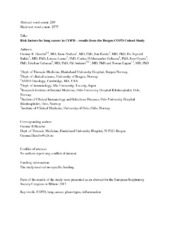| dc.contributor.author | Husebø, Gunnar Reksten | en_US |
| dc.contributor.author | Nielsen, Rune | en_US |
| dc.contributor.author | Hardie, Jon Andrew | en_US |
| dc.contributor.author | Bakke, Per S. | en_US |
| dc.contributor.author | Lerner, Lorena | en_US |
| dc.contributor.author | D'Alessandro-Gabazza, Corina | en_US |
| dc.contributor.author | Gyuris, Jeno | en_US |
| dc.contributor.author | Gabazza, Esteban | en_US |
| dc.contributor.author | Aukrust, Pål | en_US |
| dc.contributor.author | Eagan, Tomas Mikal | en_US |
| dc.date.accessioned | 2020-05-06T08:10:16Z | |
| dc.date.available | 2020-05-06T08:10:16Z | |
| dc.date.issued | 2019 | |
| dc.Published | Husebø G, Nielsen R, Hardie JA, Bakke PS, Lerner L, D'Alessandro-Gabazza C, Gyuris J, Gabazza, Aukrust P, Eagan TML. Risk factors for lung cancer in COPD - results from the Bergen COPD cohort study. Respiratory Medicine. 2019;152:81-88 | eng |
| dc.identifier.issn | 1532-3064 | |
| dc.identifier.issn | 0954-6111 | |
| dc.identifier.uri | https://hdl.handle.net/1956/22102 | |
| dc.description.abstract | Background: COPD patients have an increased risk of developing lung cancer, but the underlying mechanisms are poorly understood. We aimed to identify risk factors for lung cancer in patients from the Bergen COPD Cohort Study. Methods: We compared 433 COPD patients with 279 healthy controls, all former or current smokers. All COPD patients had FEV1<80% and FEV1/FVC-ratio<0.7. Baseline predictors were sex, age, spirometry, body composition, smoking history, emphysema assessed by CT, chronic bronchitis, prior exacerbation frequency, Charlson Comorbidity Score, inhalation medication and 44 serum/plasma inflammatory biomarkers. Patients were followed up for 9 years recording incidence of lung cancer. Cox-regression models were fitted for the statistical analyses. The biomarkers were evaluated using principal component analysis. Results: 28 COPD patients and 3 controls developed lung cancer, COPD patients had a significantly higher risk of developing lung cancer, (HR 5.0; 95% CI 1.5–17.1, p < 0.01, adjusted values). Among COPD patients, emphysema (HR 4.4; 1.7–10.8, p < 0.01) and obesity (HR 3.3; 1.3–8.5, p = 0.02) were associated with a higher cancer rate. Use of inhaled steroids was associated with a lower rate (HR 0.4; 0.2–0.9, p = 0.03). Smoking status, pack-years smoked or levels of systemic inflammatory markers, except for interferon gamma-induced protein 10, did not affect the lung cancer rate in patients with COPD. Conclusion: Patients with COPD have a higher lung cancer rate compared to healthy controls adjusted for smoking. The presence of emphysema and obesity in COPD predicted a higher lung cancer risk in COPD patients. Systemic inflammation was not associated with increased lung cancer risk. | en_US |
| dc.language.iso | eng | eng |
| dc.publisher | Elsevier | eng |
| dc.rights | Attribution-NonCommercial-NoDerivs CC BY-NC-ND | eng |
| dc.rights.uri | http://creativecommons.org/licenses/by-nc-nd/4.0/ | eng |
| dc.title | Risk factors for lung cancer in COPD - results from the Bergen COPD cohort study | en_US |
| dc.type | Peer reviewed | |
| dc.type | Journal article | |
| dc.date.updated | 2020-01-15T14:16:24Z | |
| dc.description.version | acceptedVersion | en_US |
| dc.rights.holder | Copyright 2019 Elsevier | |
| dc.identifier.doi | https://doi.org/10.1016/j.rmed.2019.04.019 | |
| dc.identifier.cristin | 1709649 | |
| dc.source.journal | Respiratory Medicine | |
| dc.identifier.citation | Respiratory Medicine. 2019, 152, 81-88. | |

